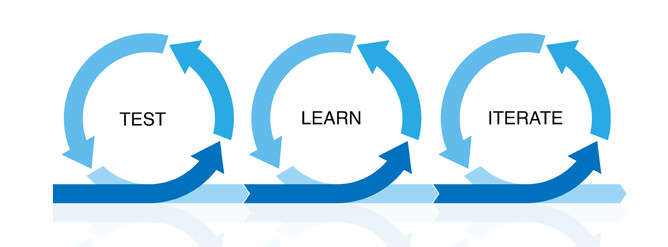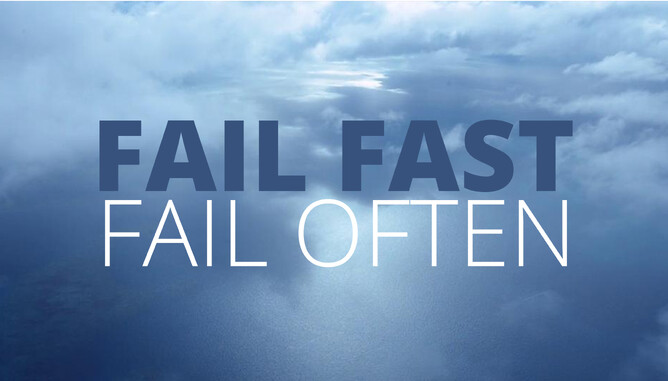If you've read any recent business books or blogs, you've probably come across the term "Fail Fast, Fail Often" or something similar. It's the battle cry of all cool Silicon Valley startups and any high flying App CEO. We like to use it around the office at Aeronet and with clients but we're always cautious of buzz words. So here's what it means to us and a few things to be cautious of when you have a "Fail Fast, Fail Often" mentality.
Dan Pontefract explains that although it "originates from Silicon Valley and its ocean of tech startups, the actual aim of “fail fast, fail often,” is not to fail, but to be iterative." Failure is par for the course with running a business. Nothing is perfect and nothing runs without a hitch but we shouldn't be aiming for failure. We should always be aiming for success, be comfortable that failure may be an outcome and that we may need to iterate what we are doing throughout.
For example, when you start a new business, you aren’t looking for that business to fail as quickly as possible and move onto the next bright shiny thing you have up your sleeve. Business is hard and there are setbacks. You are, however, not wanting to be precious about things that don't work and rather than "flogging a dead horse", look to iterate and change things to find success.
Another example may be a marketing strategy that isn't working. You generally try a marketing strategy because you know people do have success with similar strategies so you shouldn't try it once and give up. You also shouldn't, however, keep doing the same thing over and over again and hope for different results. You need to iterate. You need to experiment with testing and learning. Fail at that one small thing quickly to not waste time and money but then test something else. Maybe the imagery you used in the marketing wasn't correct, the wording was wrong or you targeted the wrong age demographic. Test. Learn. Iterate.
"Fail Fast, Fail Often" should be an approach to running a company or developing a product that uses lots of little experiments with the idea that some will work and grow and others will fail and die as explained by David Brown of TechStars.
Iteration is not a failure when it leads to success. Thomas Edison, for example, “failed” 9,000 times before he was successful with his invention of the light bulb. We'd call that the ultimate in iterating! If Edison had done what many people do when "failing fast", he may have stopped his testing and learning and in the process kept all the chandlers (makers of candles) in business!
Iteration is how normal businesses grow and change and it shouldn't be haphazard and it doesn't have to be fast; fast is a relative term. It should be methodical, planned and executed at a pace that suits the organization and the project. For some, this is a process that happens over a longer period of time (think automobile design) and for others, it happens very quickly (think app/game development).
How to foster a "Fail fast" mentality?
There are a lot of ways that you can encourage your organization to embrace the "fail fast, fail often" mentality, especially in your team. Here are a few principles and ideas to start with:
- Give your team opportunities to try things, experiment, see results and iterate.
- Allow, and even embrace, failure as it is the only way to get to true innovation.
- Try iterating small things first that don’t interrupt your whole operation
- Find safe and fast ways that work for you and your team to fail
- Talk about what "fail fast, fail often" means as a team and give clear examples where it worked and didn't work.
How does "fail fast, fail often" play out with Aeronet & our clients?
When we start a project with a new aviation client, we often talk about "failing fast". What this means in our context is working out where Aeronet is a good fit for your business and where Aeronet might not be a good fit for your business. We want to find your requirements out as quickly as possible and, if we can meet them, great! We can push forward with the project happy in the knowledge we're all going to get the results we want. If we can't meet all your requirements however, we can all walk away from the project early, as friends. At Aeronet, we love solving people's problems and we hate fitting square pegs into round holes.
We also have this same philosophy in our internal processes. We like to try new things, test them, see the results, iterate again if required or, if the change was successful, move on to the next thing. This allows us to move quickly on things but also make sure the things we are trying are working. Trying something once and then instantly determining it a huge success or an abject failure is not a good way to see progress.
The end result of "fail fast, fail often"
Are we in a better place than we were yesterday? Are we in a better place better than we were last week? Are we in a better place better than we were last month? If you can answer yes to these questions, you are iterating, making changes on the go and getting results. This is all part of a true "fail fast, fail often" mentality and shows that things are heading in the right direction.
Perhaps the saying should change to "Test, learn, & iterate at a pace that suits the organization and the project" but that doesn't have the same ring to it.



